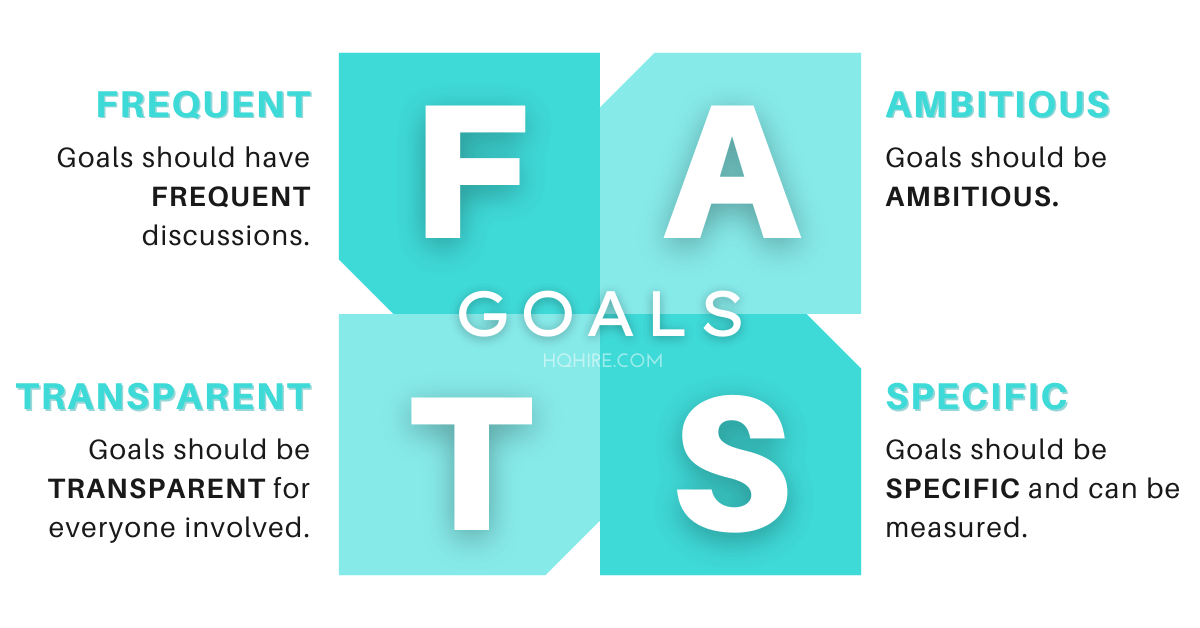Getting from SMART to FAST Goals setting might be the best decision you make this year.
The conventional wisdom is to set SMART Goals – Specific, Measurable, Achievable, Relevant, and Timely. This is the golden standard of goal setting unchanged for decades.
While both ways of setting goals for your professional and personal life are effective to a certain extend.
In this ever-changing environment, SMART goals setting is conventionally done once a year. More importantly, seldom do we ask this fundamental question,
“Does SMART Goals still work?”
Donald Sull of MIT suggests that SMART Goals are outdated, and not as efficient in turning strategy into results.
“When SMART Goals are not so smart, we should use FAST Goals instead.”

What are FAST Goals?
FAST Goals is one of the best alternatives to SMART Goals. Integrated into your personnel life, or organization’s objective setting. FAST Goals setting is the natural evolution for a rapidly changing environment.
FAST is the acronym for – Frequent discussion, Ambitious, Specific, and Transparent.
FAST goal-setting methodology emphasizes the alignment with strategic priorities between parties when pursuing the goal. FAST Goals is one of the very few goal-setting techniques that enable course corrections as circumstances change.
How to write FAST Goals?
When learning how to write FAST goals, 4 elements should be found during your goal setting.
- Goals should be Frequently discussed to enable course corrections due to changes.
- Goals should be Ambitious so that we can always improve performance.
- Goals should be Specific and can be measured so that we can identify what is working and what is not.
- Goals should be Transparent for everyone involved so that we can remove activities that are unaligned with our goals.
Frequent Discussions
FAST Goals have to be frequently discussed to evaluate the progress. With a link to feedback on potential improvement opportunities, these frequent discussions allow you to focus on what matters. This process helps to give guidance to key decisions that drive to reach the goal.
Ask yourself these questions:
- Are we on track to reach our goal?
- Is there any unforeseen changes that require us to make some corrections?
- What can we do to improve further?
These questions help in your goal setting to ensure that you are always aligned and on track to reach your goal.

Ambitious
FAST Goals have to be ambitious to make you try harder. Being ambitious will not only let you maximize your potential, but it will also improve your performance.
“Aim for the sky, that way you’ll fall in the cloud.”
When you are ambitious, you will innovate ways to achieve your goals.
Ask yourself these questions:
- What even more do I want to achieve?
- How do I exceed my own expectation?
- Is this the best I can do? Or can I do something greater?
Being challenged helps to motivate you to do something even better. These questions help to ensure you are always doing your best.

Specific
FAST Goals have to be absolutely specific with your goals. The clarity in setting your goals will help you to know what to expect. This will aid you in identifying what is working, and what is not.
Having a specific goal is the only way to understand your progress, so you can improve and move closer to your goal.
Ask yourself these questions:
- What exactly do I want to achieve?
- Is my goal clear and concise that can be explained to anyone within one sentence?
These questions help you to ensure that you are always moving closer to your set goals.

Transparent
FAST Goals have to be transparent to the team who are involved. Enhancing the clarity will improve the understanding of the current progression.
Having a goal that is transparent to the team will help each stakeholder to understand how each of the activities aid in reaching the final goal.
With that, you can remove activities that are unaligned with the goals, and place resources in the right place.
Ask yourself these questions:
- What role do we play in achieving this goal?
- Is the task we are doing really contribute to the success of reaching the goal?
- What is our progress and how do we utilize our resources more effectively.
These questions help in giving an overall view of your current progress. Like A3 in project management, this gives the team a high-level view of the task performed in achieving the goal.

FAST Goals vs SMART Goals
FAST Goals setting is more dynamic when compared to SMART Goals. But each has its uniqueness in its application.
FAST Goals are more suited for an organization’s objective setting, a situation where more than one individual is involved.
It proved to be highly effective when used in an ever-changing environment, where changes have to be made due to unforeseen circumstances.
SMART Goals on the other hand are suitable for both setting personnel goals and organizational goals.
As the golden standard for goal setting was created in the 1980s. SMART Goal setting proves to be an effective way to set any form of long-term goals.
Both FAST and SMART goals are amazing tools to help you in reaching your goal.
If you find yourself screaming, “I hate SMART Goals”, and looking for alternative goal-setting models.
Try setting goals the FAST way.
Donald Sull of MIT suggests that SMART Goals are outdated, and not as efficient in turning strategy into results.
“What do you think?”

Best Alternative to SMART Goals
Questions?
- Do you think FAST is better than SMART Goals? Why?
- What other alternatives to SMART Goals do you know about?
PS. Do you know you can improve your productivity with the 3-minute productivity rule?
Up Next… Use WISE Goals with FAST goals to maximize your success in achieving your goal!
Read Also:
- +21 Best Types of Goal Setting Techniques (Succeeding at Work)
- Pomodoro Technique: Time Management Method to Boost Your Productivity
- Ultimate Guide to Hoshin Kanri (Policy Deployment) Strategic Planning (Step Guide)
- Management By Objectives (MBO) Goal Setting Model (Examples and Templates)
- OKR Framework: Ultimate Guide to Achieving Key Result & Goals (with Templates + Examples)
Join over 11,000+ achievers who are committed to achieving their career goals!






